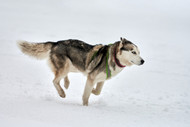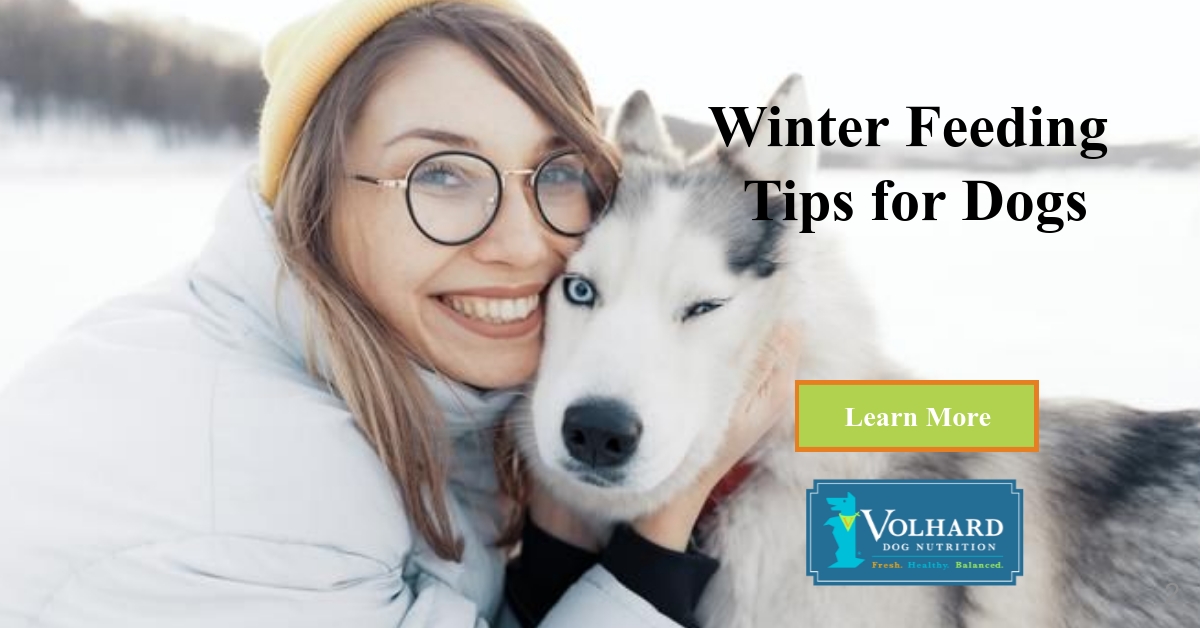How to Keep Your Dog’s Weight Under Control During the Winter Holidays
Posted by Volhard Dog Nutrition on Jan 22nd 2021
We are right in the middle of the holidays, and numerous celebrations and family events find themselves on our calendars. We want to celebrate the last weeks of the year festively, so our tables are packed with all sorts of food. While we do enjoy long dinners in the company of our loved ones, in many cases, out of love for our pets, we tend to share the bounty of our tables with our canine companions.
Although dogs enjoy being part of the same food customs as dog owners, in reality, food excess in combination with a slowed exercise schedule often leads to unwanted weight gain.
This makes dog owners immediately consider ways through which their furry friends can lose the extra pounds gained during the holidays.
While humans resort to weight loss diets to get back in shape, here at Volhard, we firmly believe that a more profound understanding of how the canine anatomy works will help dog owners realize that a proper lifestyle based on the right calorie intake and exercise is the best way for your dog to stay in shape!
Some Dogs Behave Differently During Winter
Aside from the food intake, another fundamental thing can affect your dog’s weight during winter–just like humans, dogs have weather preferences.
On the one hand, some dog breeds, such as the Akita, the Alaskan Malamute, or the Bernese Mountain Dog, absolutely adore snow and spending time outdoors during winter.
On the other hand, other dog breeds have set aside winter as their lazy season, when they tend to be less active and conserve their energy for thermoregulation.
This, of course, is not something that should alarm dog owners—being active during warm seasons makes up for being lazy during winter.
However, when the energy consumption is low, you must keep a more vigilant eye on your dog’s calorie intake—after all, laying around eating all day is a sure ticket to weight gain!
Understanding Your Dog’s Calorie Needs
Akin to humans, dogs require a certain amount of calories per day to stay healthy.
The number itself may vary, depending on several factors, such as age and weight.
For example, while a small dog who does not exercise that much is content with approx. 370 calories per day, a much bigger dog, weighing around 80-90 pounds, requires as much as 1,700 calories per day.
Knowing how to keep an eye on your dog’s calorie intake is essential for maintaining healthy weight levels.
As dog owners, however, our general tendency is to stick to one feeding plan rather than to include versatility into our dogs’ eating habits, and never is this more obvious than during winter—the feeding regimen stays the same while our furry friends exercise less and less.
The same happens to older dogs—as they age, their necessary calorie intake decreases due to lack of exercise, yet the same amount of food is found in their bowls.
As the winter months pass, you suddenly realize that your dog is 10-15% above the ideal body weight, and you start wondering how to remedy the situation.
The time has come to investigate the 3 best ways to ensure your dog’s weight levels stay normal during winter!
#1: Count the Calories in Your Treats
We never take into account how many calories are in the table food we feed to our dogs.
Even if we only feed table food to our dogs once or twice a day, at the end of the holiday season, it will show.
For example, for a 30-pound dog, an extra 3-5 pounds will make their hips disappear and will drastically reduce their energy levels and muscle mass.
There is no harm in adding fresh food to your dog’s diet; however, keeping a balance is essential, so make sure that you compensate for the additional calorie intake by cutting down on dog food intake.
#2: No Trust in Dieting
As you are looking for weight-loss alternatives for your dog, you might stumble upon food that is primarily marketed as a weight-loss food, such as with some kibble.
However, you must not fall for these types of creatively marketed foods as the protein levels are usually low and this fiber-rich food will only pass right through your dog’s digestive system with no nutrient value.
There is no such thing as weight loss food needed when you can just reduce your caloric intake on a nutritious food that is well balanced instead.
Here at Volhard, we strongly disagree with the concepts of “dieting” and “diet food”.
Instead, we believe that, akin to humans, the dog’s nutritional plan must be based upon certain requirements—constantly weighing your dog, coupled with a calorie intake suited to your dog’s needs, is essential.
As the calorie intake is reduced to normal intake, so will your dog’s weight revert to adequate levels.
#3: Work Exercise Into Your Dog’s Schedule
Dogs are highly intelligent creatures, which require constant exercise and mental stimulation for a healthy life.
Even if your dog might be something of a lazy pooch, just because there is not that much to do outside during winter, that does not mean they can just lay on the sleeping mat the whole day.
Creating an exercise plan for the winter months, filled with activities that will stimulate your dog’s mind, body, and scent will keep it healthy while minimizing the chances of weight gain.
For helpful ideas, make sure that you check our winter fitness article!
As the holiday season brings a lot of joy and tables packed with delicacies into our midst, you must remember that even if your dog loves to share these moments with us, keeping an eye on their weight is essential.
Let your furry friend enjoy the holiday season with you, yet in a reasonable manner and without needless weight intake. It is much easier to prevent weight gain than to try and affect weight loss.
For more information concerning natural weight loss in dogs, feel free to contact us or check out our blog!
Volhard Dog Nutrition and its expert nutritionists are now offering online consultations to help more dog parents discover why, what, and how to feed their dogs the healthiest of foods! Speaking to a Volhard nutritionist will help you understand the inseparable relationship between healthy food, a healthy body, and a healthy mind. If you're interested in contacting one of our Volhard nutritionists, don't hesitate to access our consultation page!



